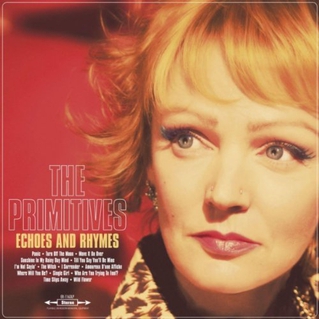Artist: The Primitives
Title: Echoes & Rhymes
Label: Elefant Records 1163
Released: April 30, 2012
The Primitives had a couple of really good LPs in the late eighties with Lovely from 1988 and Pure released in 1989. The argument against this band from Coventry was that they weren’t breaking any artistic ground creating Manchester-influenced jangly pop songs. I feel that writing a great hook is an art in itself. So, I tend to disagree critics that can’t identify with a hook. I find that very shallow.
To you folks who couldn’t identify with their hooks, here are 14 more hooks, but they’re all cover songs. And I’ll wager that some of the geekiest of all music-heads would have trouble identifying the original recording artists. Luckily for us and through the kindness of guitarist Paul Court, all that information is written in the liner notes.
The LP opens with Reparata & The Delrons’ “Panic,” which fits perfectly among their past hits, like “Crash,” slightly distorted power-pop embodying the spirit of 60’s girl groups. It’s songs like this that drew the comparisons between lead vocalist Tracy Tracy and Blondie’s Debbie Harry.
The second track digs deep as it is the flip side of the “Lolita Ya Ya” single from the Kubrick film, Lolita. The star of the film, the fourteen-year-old Sue Lyon, originally sang “Turn Off The Moon.” The Primitives pick up the tempo and drop the strings, converting a very white middle of the road number into a rocker.
The band is good at adding an edge to these female fronted sixties numbers. They’re still poppy but there’s a bit of that punk edge to them. “Move It On Over” doesn’t stray far from the Le Grand Mellon original, the guitar is just meaner.
Their take on Polly Niles’ psyche-folk number from 1970 has more of the psychedelic haze than the folk simplicity. “Till You Say Your Mine” is a very honest interpretation of a Jackie DeShannon song, topping Olivia Newton-John’s 1966 jangly version.
Guitarist Paul Court takes his stab at Nico’s version of the Gordon Lightfoot number, “I’m Not Saying.” It’s Tracy’s harmony that gives it more of an Ian & Sylvia flavor. “I Surrender,” the rhythmically stiff Northern Soul stomper loosens up with a slightly syncopated beat and a buzzing keyboard replacing the horns.
Sandy Posey’s “Single Girl,” is an exception to most of the other tracks on the LP, charting at number twelve in the US and number fifteen in the UK, not making it a rarity. But as some of the girl group lyrics sound corny after time, the Primitives don’t completely transform this song to modern-day relevance, but their emphasis on the bridge provides the subject with more independence.
All and all, the Primitives take these rare tracks and either improve upon them or treat them with the utmost of care, respecting the originals. Covers records can fail miserably, especially if the material is too familiar. Their choices, along with the aid of producer Paul Sampson, make this a very enjoyable album. Also, with current bands out there like, The School, the Pipettes and The Like trying to recreate that girl-group feeling, The Primitives show a good way to attack it is straight on. Find some of those rare songs and learn from them and make them yours.



